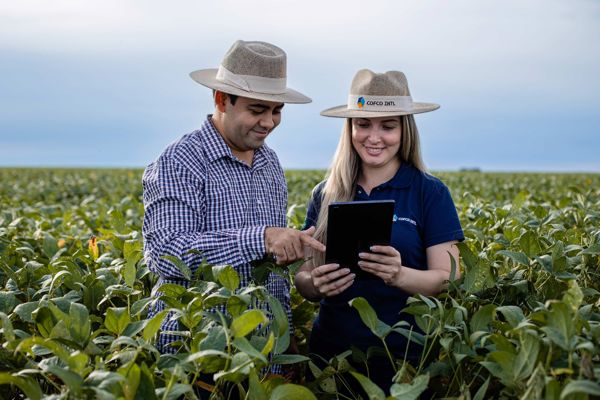
COFCO around the world: Brazil - Cementing our position in the agricultural powerhouse
Founded in 1892, the port of Santos stands as symbol of Brazil’s immense transformations in centuries gone past.
Millions of immigrants reached the country via the port in the late 19th and early 20th century, proceeding to the interior by railway. Initially used to export coffee from the state of São Paulo, the port gradually expanded, increased its capacity and diversified the range of exported goods.
Today, Santos is Latin America’s busiest export hub connecting over 600 ports in 125 countries and exporting all the region’s main commodities including coffee, corn, sugar, and soy.
As the most important foreign trade route in Brazil, it is also the beating heart of COFCO International’s operations.
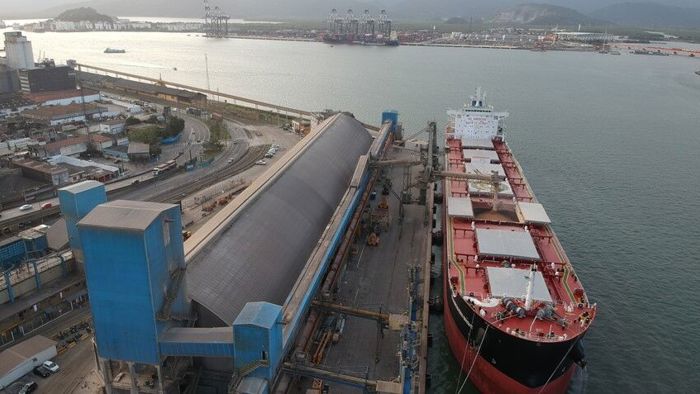
COFCO International's T12A Terminal in Santos
Growing together
As the country grew to become the world’s fourth largest producer of grains and oilseeds as well as the world’s second largest exporter, COFCO International continuously strengthened its position too.
The company has a strategic footprint at all the main export corridors and a presence throughout the entire value chain connecting Brazil’s farmers with markets around the world.
COFCO sources and exports grains, oilseeds, sugar, coffee, and cotton. It also produces ethanol which is sold mainly on the local market. From originating and processing to storing and exporting, it is present at all of Brazil’s main points of export, transporting goods by truck, barge, and rail.
For grains and oilseeds, it has 2 port terminals, 1 processing plant, and 19 storage facilities scattered around the country.
The processing plant in Rondonópolis is strategically located in Mato Grosso State, the largest soybean producer in Brazil. With direct access to Santos by railroad and a pipeline under construction connecting nearby biodiesel distributors, the plant can process 1.3 million tonnes per year of soybean and produce almost 350,000 tonnes per year of biodiesel.
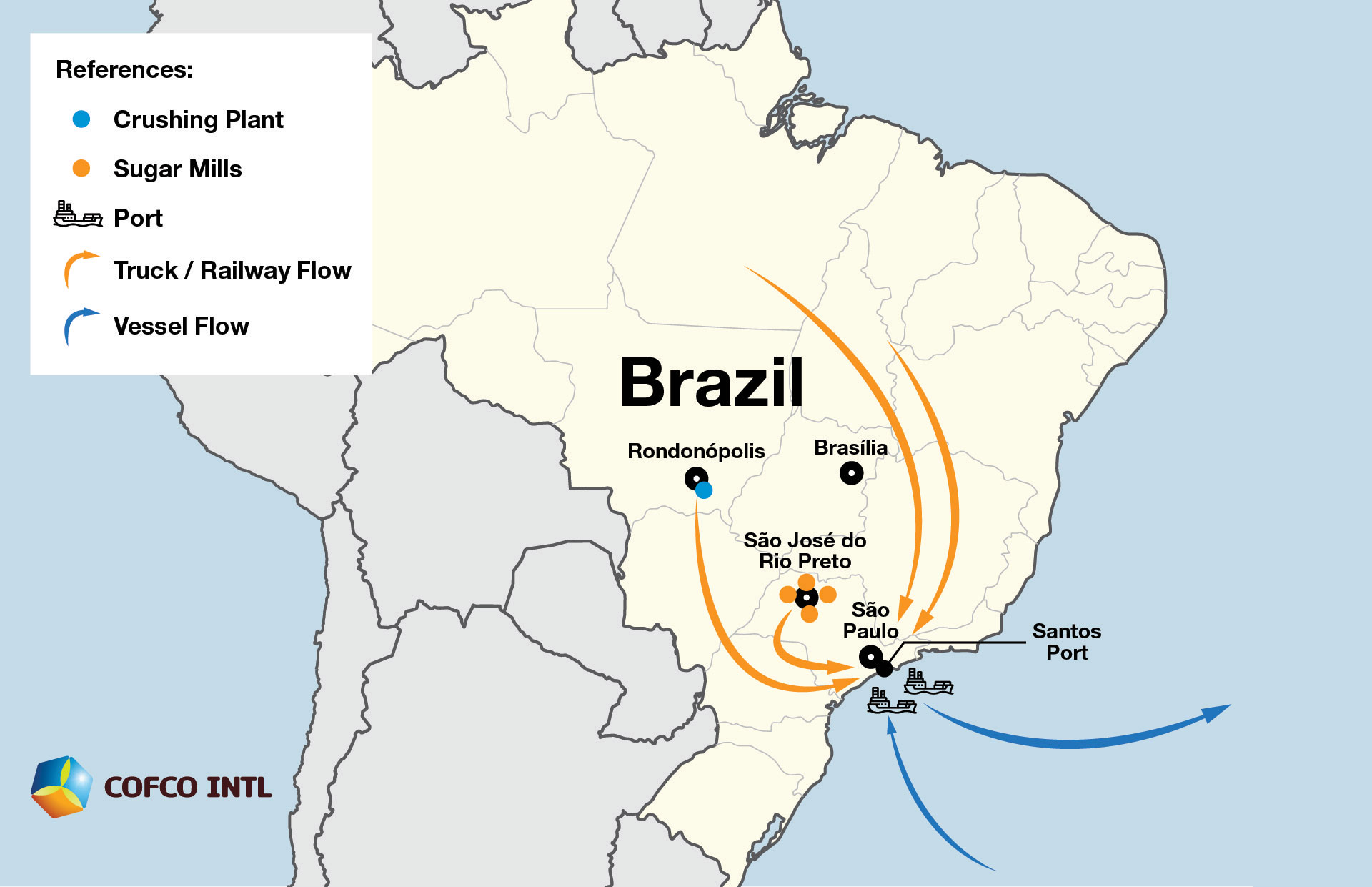
Sweet spot
The company is also one of the world’s top five sugar traders, moving over 6 million tonnes in 2020, of which it produced 1.45 million tonnes itself at its four mills in Brazil. Depending on the global demand for sugar and for transport fuel, the company’s mills can alternate to produce either sugar or ethanol which can be blended to create biofuel.
- Established presence in the South Center Region of Brazil
- 4 mills with a crushing capacity of 17 million tonnes of sugarcane
- 6,000 dedicated employees
- Increase in crushing by 45% since 2015
To feed its sugar mills, COFCO International has partnerships with third parties to grow its own sugar cane. It then plants, treats, harvests, and processes the cane to produce sugar, ethanol, and energy. These extensive operations make it one of the top sugar and ethanol producers in Brazil.
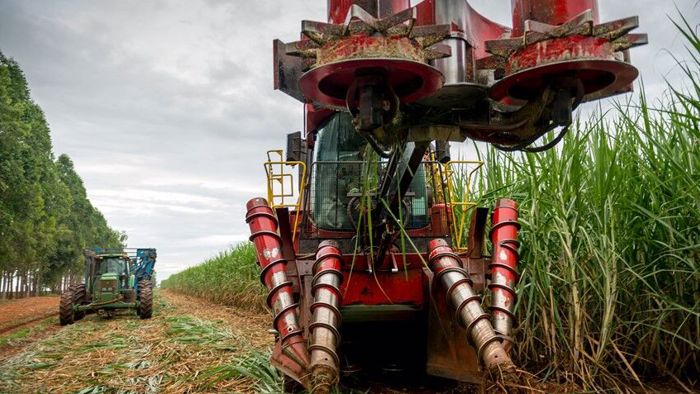
COFCO's sugar mills in Brazil produce sugar and ethanol products that are used in local and international markets
Thanks to improvements in industrial efficiency, farming productivity and constant investments in technology, data and operational processes, COFCO International has remained competitive in the business and expand its investments with strong returns.
Added value: local expertise, global outlook
The wide local and global network combined with profound knowledge of Brazil’s complex commodities landscape is seen as one of the company’s strongest points.
And with a reputation as a top employer, COFCO International is able to attract Brazil’s top commodities trade talent. In 2020, it was recognised as one of the country’s best performing companies on people management by the Valor Carreira survey for the third year running.
Rooted in China, the company also plays a vital role in strengthening the links between Brazil and its main export market. Brazil is China’s most important economic and political partner in South America and a key market for the expanding soy production.
The company’s strong ties on the Chinese market combined with a well-established local operation, make COFCO International a valuable business partner for Brazil’s producers.
Sustainability and innovation
Brazil is also where many of the company’s technology, innovation as well as sustainability efforts originate.
COFCO International sees traceability as the key to developing sustainable supply chains. For that reason, the company has undertaken risk analyses and collected satellite data across millions of hectares of farms.
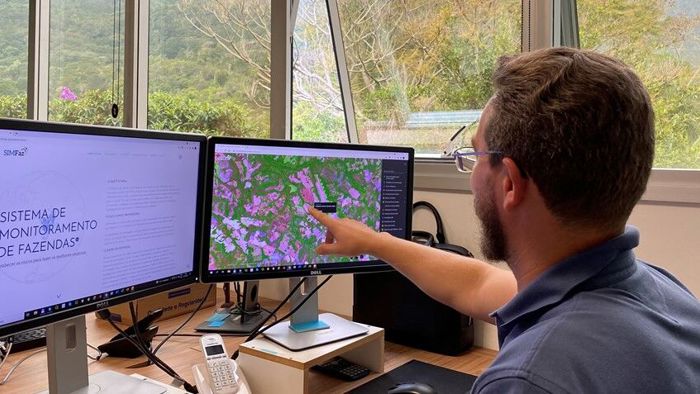
COFCO partners with Agrosatélite to screen suppliers’ soy farms to ensure they comply with key environmental and social criteria. Photo: Agrosatélite
The company, alongside other major commodities traders, is also actively engaged in the Soft Commodities Forum (SCF) where it works to achieve transparent and traceable soy supply chains in Brazil’s Cerrado region.
Its ambitious target to achieve full traceability to farm for directly sourced soybean by 2023 is supported by a joint project with the International Finance Corporation (IFC), a member of the World Bank Group.
The cooperation focuses on screening soy farms to ensure compliance with key environmental and social criteria, and build farmer capacity to apply more sustainable farming practices.
The company's sustainability-linked loan announced in 2019, the largest among commodity traders, is linked with the company’s sustainability performance with a special focus on traceability of directly sourced soy in Brazil.
And while soy remains the key focus of the company’s sustainability work, Brazil’s coffee has also seen increased efforts aimed at lowering carbon footprint, reforesting land, supporting local communities as well as water conservation.
Today, Brazil accounts for 40% of COFCO International’s worldwide investments. And of its 11,000 global staff approximately two thirds are based there.
And with global demand racing ahead, the company plans to grow further too. Looking confidently to the future, it will continue to invest, stay committed and contribute to creating the country’s stable and sustainable value chains.

